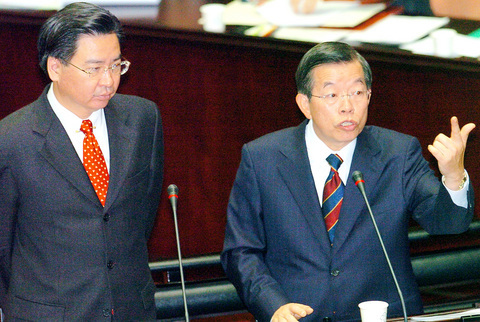Premier Frank Hsieh (謝長廷) said yesterday the government will continue to promote peaceful dialogue across the Taiwan Strait and will uphold its "active opening, effective management" cross-strait investment policy instead of reinstating the previous "no haste, be patient" strategy.
Hsieh made the remarks during a question-and-answer session at the Legislative Yuan in response to a query from Chinese Nationalist Party (KMT) Legislator Lai Shyi-bao (許舒博).
Lai asked whether the administration would revise its cross-strait policy after China's enactment of its "Anti-Secession" Law and the massive protest march in Taipei last Saturday against what he called Beijing's "ill-intentioned" legislation.

PHOTO: CHIEN JUNG-FENG, TAIPEI TIMES
While acknowledging that the new law has strained relations, Hsieh said the government, after a comprehensive evaluation, has decided to adopt a peaceful and rational manner in dealing with the new challenge.
"Peace and rationality are the best strategy to forge domestic unity and counter China's threat. Many countries have denounced the law that codifies China's longstanding threat to attack Taiwan," Hsieh said, adding that all of these developments have proved the efficacy of the government's response strategy.
As to the future development of cross-strait relations, Hsieh said the government will adopt a wait-and-see attitude.
"We must watch Beijing's follow-up moves before we hammer out our new cross-strait policy. Once we are sure that our national security is not at stake, we will continue to promote peaceful cross-strait dialogue, " he said.
In some cases, he said, "silence is golden."
Asked whether the government is likely to reinstate the "no haste, be patient" cross-strait investment policy implemented by former president Lee Teng-hui's (李登輝) KMT administration, Hsieh said it would not, because the policy couldn't resolve practical problems faced by Taiwanese businesspeople.
The premier said Hsu Wen-lung (許文龍), founder of the Chi Mei Group, one of the nation's largest private petrochemical and optoelectronics groups, was the first entrepreneur to fall victim to the new law.
According to Hsieh, Hsu made huge investments in China during the KMT administration when the "no haste, be patient" policy was in place. He said although stringent restrictions on China-bound investments had been set, enforcement had been lax, resulting in many flaws and problems.
"The DPP administration has replaced this ineffective policy with an `active opening, effective management' one. We would rather adopt a more relaxed policy toward investment in China while tightening enforcement, " Hsieh said.
On Saturday, Hsu, who retired from the Chi Mei Group chairmanship a year ago, published an open letter in a local newspaper apparently throwing his support behind Beijing's "one China" policy and the Anti-Secession Law.
Meanwhile, former Government Information Office director-general Lin Chia-lung (林佳龍) said yesterday that Hsu's statement would not hurt his campaign for Taichung City mayor in the December elections. Hsu is Lin's great uncle. But Lin said he would not presume to say whether Hsu's statement was the result of Chinese pressure.

An essay competition jointly organized by a local writing society and a publisher affiliated with the Chinese Communist Party (CCP) might have contravened the Act Governing Relations Between the People of the Taiwan Area and the Mainland Area (臺灣地區與大陸地區人民關係條例), the Mainland Affairs Council (MAC) said on Thursday. “In this case, the partner organization is clearly an agency under the CCP’s Fujian Provincial Committee,” MAC Deputy Minister and spokesperson Liang Wen-chieh (梁文傑) said at a news briefing in Taipei. “It also involves bringing Taiwanese students to China with all-expenses-paid arrangements to attend award ceremonies and camps,” Liang said. Those two “characteristics” are typically sufficient

The brilliant blue waters, thick foliage and bucolic atmosphere on this seemingly idyllic archipelago deep in the Pacific Ocean belie the key role it now plays in a titanic geopolitical struggle. Palau is again on the front line as China, and the US and its allies prepare their forces in an intensifying contest for control over the Asia-Pacific region. The democratic nation of just 17,000 people hosts US-controlled airstrips and soon-to-be-completed radar installations that the US military describes as “critical” to monitoring vast swathes of water and airspace. It is also a key piece of the second island chain, a string of

A magnitude 5.9 earthquake that struck about 33km off the coast of Hualien City was the "main shock" in a series of quakes in the area, with aftershocks expected over the next three days, the Central Weather Administration (CWA) said yesterday. Prior to the magnitude 5.9 quake shaking most of Taiwan at 6:53pm yesterday, six other earthquakes stronger than a magnitude of 4, starting with a magnitude 5.5 quake at 6:09pm, occurred in the area. CWA Seismological Center Director Wu Chien-fu (吳健富) confirmed that the quakes were all part of the same series and that the magnitude 5.5 temblor was

The Central Weather Administration has issued a heat alert for southeastern Taiwan, warning of temperatures as high as 36°C today, while alerting some coastal areas of strong winds later in the day. Kaohsiung’s Neimen District (內門) and Pingtung County’s Neipu Township (內埔) are under an orange heat alert, which warns of temperatures as high as 36°C for three consecutive days, the CWA said, citing southwest winds. The heat would also extend to Tainan’s Nansi (楠西) and Yujing (玉井) districts, as well as Pingtung’s Gaoshu (高樹), Yanpu (鹽埔) and Majia (瑪家) townships, it said, forecasting highs of up to 36°C in those areas